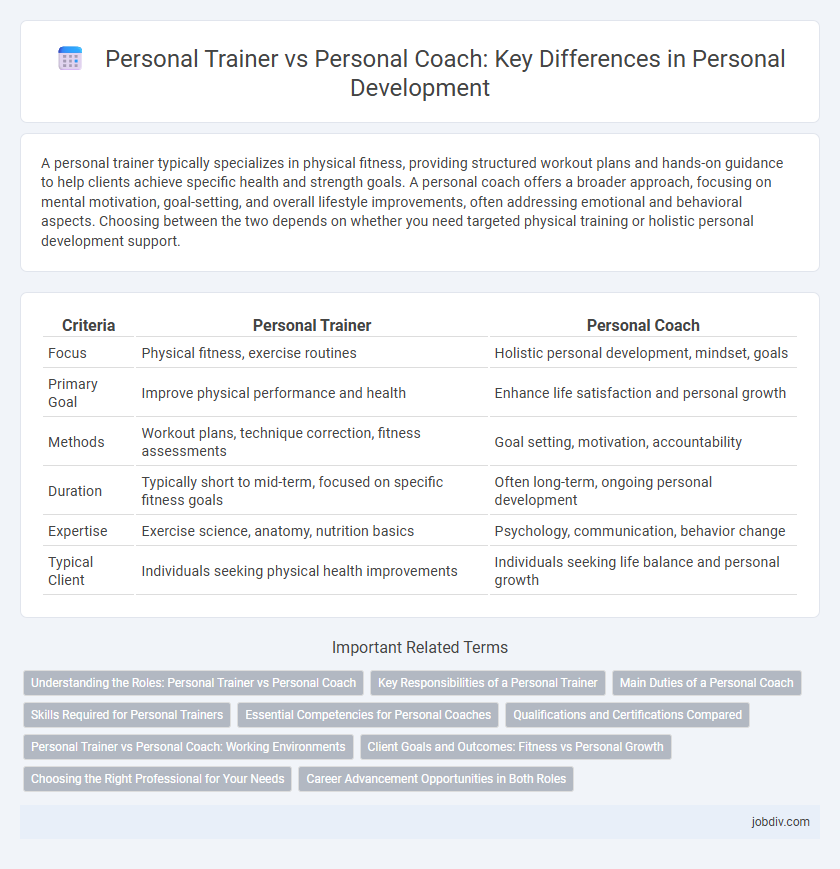A personal trainer typically specializes in physical fitness, providing structured workout plans and hands-on guidance to help clients achieve specific health and strength goals. A personal coach offers a broader approach, focusing on mental motivation, goal-setting, and overall lifestyle improvements, often addressing emotional and behavioral aspects. Choosing between the two depends on whether you need targeted physical training or holistic personal development support.
Table of Comparison
| Criteria | Personal Trainer | Personal Coach |
|---|---|---|
| Focus | Physical fitness, exercise routines | Holistic personal development, mindset, goals |
| Primary Goal | Improve physical performance and health | Enhance life satisfaction and personal growth |
| Methods | Workout plans, technique correction, fitness assessments | Goal setting, motivation, accountability |
| Duration | Typically short to mid-term, focused on specific fitness goals | Often long-term, ongoing personal development |
| Expertise | Exercise science, anatomy, nutrition basics | Psychology, communication, behavior change |
| Typical Client | Individuals seeking physical health improvements | Individuals seeking life balance and personal growth |
Understanding the Roles: Personal Trainer vs Personal Coach
A Personal Trainer primarily focuses on physical fitness by designing exercise programs and guiding clients through workouts to improve strength, endurance, and overall health. In contrast, a Personal Coach addresses broader life goals, incorporating mindset, motivation, and accountability to help clients achieve personal development beyond just physical activity. Understanding these roles highlights that Personal Trainers specialize in exercise science, while Personal Coaches offer holistic support for behavioral change and goal-setting.
Key Responsibilities of a Personal Trainer
A Personal Trainer specializes in designing and implementing customized fitness programs tailored to an individual's physical goals and health conditions. They conduct assessments, guide proper exercise techniques, monitor progress, and adjust workouts to maximize effectiveness and prevent injury. Their expertise encompasses strength training, cardiovascular conditioning, nutrition basics, and motivational support to enhance overall physical performance.
Main Duties of a Personal Coach
A Personal Coach primarily focuses on helping clients set and achieve long-term personal and professional goals through motivation, accountability, and strategic planning. They provide emotional support and guidance, fostering personal growth and self-awareness to improve overall life satisfaction. Unlike a Personal Trainer who emphasizes physical fitness, a Personal Coach addresses mental and behavioral challenges to unlock a client's full potential.
Skills Required for Personal Trainers
Personal trainers require in-depth knowledge of exercise science, anatomy, and nutrition to design effective workout programs tailored to individual fitness goals. Strong communication skills and motivational techniques are essential to encourage clients and ensure adherence to training plans. Certifications from accredited organizations like NASM or ACE validate a trainer's expertise and commitment to professional standards.
Essential Competencies for Personal Coaches
Personal coaches excel in essential competencies such as active listening, emotional intelligence, and motivational techniques, enabling them to support clients' holistic growth beyond physical fitness. Unlike personal trainers who primarily focus on exercise programming and physical health, personal coaches emphasize goal-setting, accountability, and mindset development for sustained personal transformation. Expertise in communication skills, behavioral change strategies, and personalized coaching plans distinguishes effective personal coaches in facilitating long-term success.
Qualifications and Certifications Compared
Personal trainers typically hold certifications from organizations like NASM, ACE, or ACSM, emphasizing exercise science and physical fitness. Personal coaches often possess credentials from institutions such as the International Coach Federation (ICF), focusing on behavioral change, motivation, and goal-setting techniques. While both roles require specialized training, personal trainers concentrate on anatomy and workout programming, whereas coaches prioritize communication skills and personal development strategies.
Personal Trainer vs Personal Coach: Working Environments
Personal trainers primarily work in gyms, fitness centers, and clients' homes, focusing on physical exercise, strength building, and injury prevention through tailored workout routines. Personal coaches operate in diverse settings such as corporate offices, virtual platforms, and outdoor environments, emphasizing goal-setting, motivation, and overall life or career development. Both professionals adapt their working environments based on client needs but differ significantly in their primary focus and interaction settings.
Client Goals and Outcomes: Fitness vs Personal Growth
A personal trainer specializes in designing fitness programs tailored to improving physical health, strength, and endurance, helping clients achieve measurable workout goals. In contrast, a personal coach focuses on holistic personal growth, guiding clients through mindset development, goal-setting, and overcoming obstacles to unlock their full potential. While personal trainers prioritize physical performance and body transformation, personal coaches emphasize emotional resilience, self-awareness, and long-term life success.
Choosing the Right Professional for Your Needs
Choosing between a personal trainer and a personal coach depends on your specific goals and lifestyle. Personal trainers focus on physical fitness, exercise routines, and injury prevention, while personal coaches emphasize mental motivation, goal setting, and overall personal development. Identifying whether you need targeted fitness guidance or broader life coaching helps in selecting the right professional to maximize your progress.
Career Advancement Opportunities in Both Roles
Personal trainers primarily focus on physical fitness and client exercise programs, offering certifications that enhance credentials and open pathways to specialized roles such as strength conditioning or rehabilitation coaching. Personal coaches emphasize holistic development including mindset, motivation, and life skills, with certifications that support career growth in executive coaching, leadership development, or mental wellness sectors. Both roles provide distinct career advancement opportunities by leveraging specialized accreditation from organizations like NASM for trainers and the International Coach Federation for coaches.
Personal Trainer vs Personal Coach Infographic

 jobdiv.com
jobdiv.com